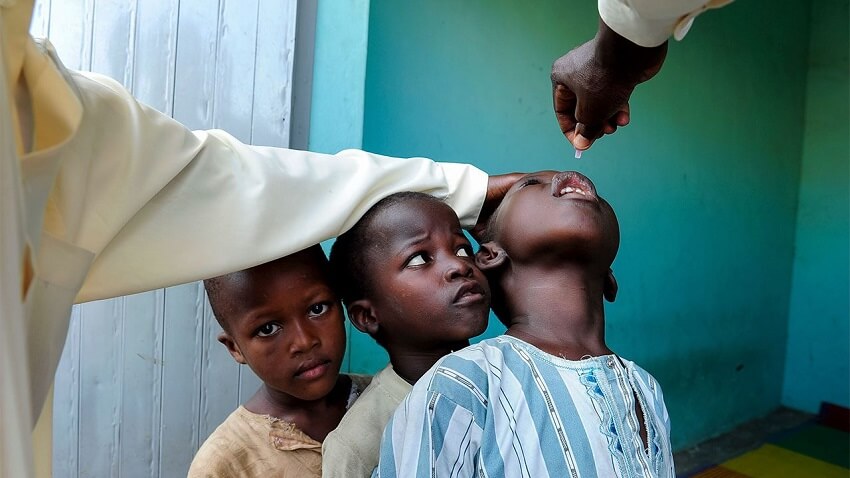The World Health Organization (WHO) and the United Nations International Children Emergency Fund (UNICEF), among others, announced on Monday that they are joining forces with international partners in new efforts to vaccinate millions of children and make up for immunizations lost due to the COVID-19 pandemic.
Tagged ‘The Big Catch-up’, the partnership involves the Vaccine Alliance, the Bill & Melinda Gates Foundation, and many other international and national health partners.
Advertisement
The international effort will focus on increasing childhood immunization rates in response to declines brought on by the COVID-19 pandemic.
UNICEF disclosed last week that the COVID-19 pandemic-related lockdowns and disruptions in healthcare caused 67 million children worldwide to miss routine vaccinations between 2019 and 2021.
It said 48 million of the 67 million children missed out on receiving routine immunization between 2019 and 2021, also known as “zero-dose” children. The countries with the highest percentages of zero-dose children as of the end of 2021 were India and Nigeria, both of which had very large birth cohorts.
However, increase in the percentage of zero-dose children were particularly noticeable in Myanmar and the Philippines.
India leads with the largest chunk of 2.7 million children with zero doses, followed by Nigeria with 2.2 million unvaccinated children globally.
Advertisement
According to UNICEF’s press release, the effort aims to reverse the declines in childhood vaccination recorded in over 100 countries since the pandemic, resulting from overburdened health services, closed clinics, and disrupted imports and exports of vials, syringes and other medical supplies.
It added that due to emergency response, ongoing challenges like conflicts, climate crises and vaccine hesitancy also contributed to the decrease in coverage rates. It said communities and families experienced lockdowns, restricting travel and access to services, and financial and human resources were limited along with access to health commodities.
In 2021 alone, almost 25 million children were estimated to have missed at least one vaccination, which will increase the prevalence and severity of outbreaks of diseases including measles, diphtheria, polio, and yellow fever that can be prevented.
UNICEF stressed that ” The Big Catch-up” aims to strengthen national health systems, save children’s lives, and safeguard populations against outbreaks that can be stopped through vaccination.
According to organization, “The Big Catch-up” will specifically focus on the 20 countries where three-quarter of the children who missed immunizations in 2021 reside while urging citizens and governments in every country to do their bit in catching up by contacting the children who missed out.
Advertisement
Although global coverage levels have decreased, UNICEF’s illustration showed that there have also been pockets of resistance. Early reports suggest that whereas Uganda maintained high coverage levels during the epidemic, India experienced a significant recovery in 2022 in terms of necessary immunization. Additionally, it stated that nations had had success contacting susceptible groups. The prevalence of immunization among nomadic populations in Kenya’s north has increased because of its partnerships with community health workers and local authorities.
It reported that partners are engaging with nations to develop health care workforces, enhance the delivery of health services, increase community trust and demand for vaccines, and address gaps and barriers to restoring immunization in order to assure progress on children immunization. In addition to catching up on childhood vaccinations, increased efforts are required to get teenagers immunized against the human papillomavirus (HPV), particularly in low- and middle-income countries where the burden of the disease is highest.
The WHO Director-General, Dr Tedros Adhanom Ghebreyesus, said “Millions of children and adolescents, particularly in lower-income countries, have missed out on life-saving vaccinations, while outbreaks of these deadly diseases have risen.
“WHO is supporting dozens of countries to restore immunization and other essential health services. Catching up is a top priority. No child should die of a vaccine-preventable disease.”
According to Catherine Russell, Executive Director of UNICEF, routine vaccinations are frequently a child’s first introduction to the healthcare system. As a result, children who miss out on their early vaccinations are at risk of being excluded from health care in the future.
“The longer we wait to reach and vaccinate these children, the more vulnerable they become and the greater the risk of more deadly disease outbreaks. Countries, global partners and local communities must come together to strengthen services, build trust and save lives,” she said.
Advertisement
Dr. Seth Berkley, CEO of Gavi, the Vaccine Alliance, said, “We cannot for a legacy of the pandemic to be the undoing of many years’ work saving more and more children from deadly preventable diseases.
“Global health partners, working with governments and communities, must do everything we can to protect the life of every child” he asserted.
The President of Global Development at the Bill & Melinda Gates Foundation, Dr. Chris Elias, said vaccines represent a victory for public health. He added that millions of children have been immunized as a direct result of the tireless efforts of hundreds of committed local health professionals and global partners who have fought to reduce the incidence of infectious diseases and eradicate polio.
According to him, in order to ensure that future generations are free from curable diseases like polio, more efforts must be put in place to provide all children with the vaccinations they need to live a healthier life.



